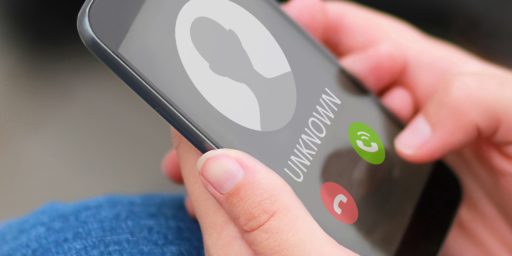Robocalls
Let's ban robocalls.
John Judis argues that the most overlooked story of the year has been “The Subversion of the Do Not Call Registry.”
The great under- or, better, un-covered story of the year: Cardholder Services and the Do Not Call Registry. You don’t know what I’m talking about? That’s because you don’t work at home. George W. Bush’s administration invaded Iraq and let Bernie Madoff run wild; but to its credit, it established the Do Not Call Registry to block telemarketers from flooding our telephones with unwanted offers. After I registered my phone number on the Federal Trade Commission’s web site in 2004, the phone calls virtually stopped. But guess what? Under the Obama administration, which claims to understand the power and wisdom of government regulation, they’ve begun again. I get seven or eight a day now (mostly I don’t answer them), including to my cell phone, where I get charged for them. Many of them have been from an outfit called “Cardholder Services.” And it’s not just me. Google “cardholder services” and you’ll find a plethora of complaints. I have already filed complaints with the FTC twice this year, and the second time I asked for an acknowledgement. But I never heard back, and the phone calls continue. A little while ago, I got a call on my cellphone from a number in Salem, Oregon. 503-902-8252. Complaints about this number are all over the web. So the Obama administration has not followed through on the one thing that the Bush administration did right.
Kevin Drum wholeheartedly agrees and offers a novel solution: annoy Charlie Schumer.
He offers a May 2009 WSJ story about robocalls selling car warranty extensions by way of explanation:
The Federal Trade Commission filed complaints on Thursday against two companies that were behind an automated telemarketing campaign that enraged Senator Charles E. Schumer and, authorities say, deceived thousands of people across the country.
Mr. Schumer, Democrat of New York, was in a meeting on Capitol Hill last week when he picked up his cellphone, triggering a phony, prerecorded sales pitch, ostensibly for an extended vehicle warranty.
Irate, Mr. Schumer became one of an estimated 30,000 Americans to make complaints about the robocalls with consumer protection authorities. He held a press conference to rail against the “robo-dialed harassment.”
Notes Kevin,
30,000 Americans had already complained about these calls and the FTC did bupkis. They obviously Do Not Care about ordinary non-powerful Americans like you and me and 29,998 others.
But then Chuck Schumer got one call on his cell phone, called a press conference, and probably threatened the FTC with complete defunding if they didn’t shut down the bastards tomorrow. And guess what? The FTC shut the bastards down.
The moral of the story here is that the FTC may not care about us ordinary schlubs, but theydo care about pissed-off senators. So I recommend that Judis make a recording of the Cardholder Services robocall, get the private cell phone number of some senator (he must have contacts that can help him with this), and then call the senator and play back the call. Voila! A high-level complaint will be registered from one of the princes of Washington, and the FTC will spring into action.
It’s worth a shot.
I’d like to see robocalls of all stripes–including political messaging, polling, charitable drives for police benevolent associations, bill collecting, and everything else–banned. The Supreme Court likely would strike down capital punishment in this case, so the penalty can not be as severe as warranted, but certainly the ban should have enough teeth to end the practice.
Yes, annoying phone calls are a relatively trivial problem and I’m generally opposed to the Federal government exercising power to solve minor annoyances. But, as I noted years ago when the original Do Not Call list came into being,
A massive collective action problem prevents individual consumers from dissuading annoying telemarketing calls on their own, so governmental action was the only recourse. The states were acting on their own creating a hornets nest of confusing regulations in an industry that has, since its inception, been regulated at the federal level. And the restriction on “speech” here is so negligible as to be non-existent. There are many ways for firms to communicate with potential consumers without creating this level of intrusion into people’s private sphere.
I don’t get the particular “Cardholder Services” calls quite as often as Dave Schuler but the constant calls are quite intrusive. While I have some call blocking capabilities, it really shouldn’t be up to individuals to come up with solutions to protect against the negative externalities of other people’s business models.







You’ll never see a better opportunity for people of all political stripes to join hands in a poly-partisan manner. I’ll bet even all you bleeding heart liberals could support waterboarding offenders as punishment for this despicable crime against humanity!
@Boyd: Boyd, I think it would be cruel and unusual to the water.
I think placing them in a room where the phone rings loudly five times every five minutes.
I’d like to ask our libertarian friends how the market would deal with unwanted phone solicitations without federal regulation. I’m not being snide, just truly curious.
@de stijl: The message seems to be “we don’t want it regulated unless it really pisses me off”.
@de stijl: I would theorize that the hard-core libertarian (I’m more of a soft-
porncore libertarian myself) would believe that if government stayed out of it, the market would likely “invent” a technological solution.@Boyd: And then the intruders would “invent” a technological way around “the solution”. Shoes for industry.
@Boyd:
You’re a Skinemax libertarian! Cool!
I guess my problem is: what will further government intervention do? They already go right around it, or just tell me flat out that their type of business is “exempt” from the DNC list (which leads to some very colourful conversations). What more can be done? Can’t people just screen calls? I know I can block numbers on both my land and cell lines (though I have an unlimited plan).
These are all groups specifically exempt from the Do Not Call law anyways, so I’m not sure on what basis the FTC could crack down on them.
As a side note, long before the federal DNC list, I was on the DMA (Direct Marketing Association) DNC list, which actually worked. I pretty much never got calls while I was on it. Once the federal law was passed, I started getting calls constantly, all from groups like polls, charities, etc. that are exempt from the law. This is because the federal list is available to anyone who requests it, so exempt groups use it as a source of new numbers, where as the DMA only gave it out to members companies.
The weird thing is, I never put my cell phone on the DNC list, and I get far more solicitation calls on the phone that IS on the DNC list than on the one that isn’t.
In laughing my way through this post I was reminded of a conversation I had with a client several years ago. He was one of those self-proclaimed “libertarian” sorts, i.e., a wealthy liberal who didn’t like paying taxes. In any case, his big mantra was always about getting the government out of this, and getting the government out of that, and that we needed purely-free markets, yada, yada. So it comes to pass that he was faced with a major liability exposure and due to a hyper technicality of his insurance program it wasn’t covered. He was going to be on the hook potentially for millions of dollars. As I explained this to him he began raging about how we should complain to the department of insurance, and that the insurance company should be fined, and that we needed to sue for coverage and bad faith, and there needed to be more regulations preventing carriers from excluding certain risks; so on, so forth. Probably the greatest irony is that he couldn’t even grasp the irony.
@Tsar Nicholas: I’m not sure the irony is as great as you think. For most libertarians, liberty comes down to individuals and businesses being able to agree to contracts on their own terms without interference from the state. In the case of robocalls, there’s no consent at all on the part of the recipient, who’s forced in the absence of government regulation to either endure the intrusion, forgo the convenience of a telephone for calls he actually wants to receive, or find some independent system for screening calls. The liberty to annoy simply doesn’t compare in this case.
I’ll be hard-pressed to find the reference, but I listened to an NPR story in the past few months that discussed those calls from “Cardholder Services” (which I too, have received numerous times) and the guest noted that those were actually an organized crime scam, not someone who would care about the Do Not Call Registry.
@James Joyner:
The liberty to annoy simply doesn’t compare in this case.
@Dustin:
I’ve been getting those cardholder service calls for months and I must admit I was curious about who it was. I never pick up calls unless the caller ID indicates it’s someone I know and they never left a message.
Now I know, thanks.
@Stormy Dragon:
Please mentally quote the unquoted parts of that post and vice versa. (PS – What happened to the edit button?)
I found the episode I referenced. It was actually on Wisconsin Public Radio, and the guest speaking was Sandy Chalmers, Administrator of the Division of Trade and Consumer Protection, Wisconsin Department of Agriculture.
Unfortunately there isn’t a printed transcript, so I transcribed the relevant bit myself here;
The full episode is about scams and protecting yourself, so it doesn’t focus exclusively on this topc, but here is the full audio.
In searching for it, I also some articles where Ms. Chalmers was referenced in how easy it is for these scams to spoof caller ids these days, using fake numbers and business names. So it doesn’t really seem like a business that can have it’s hand slapped for ignoring the rules.
Now, I’ve wasted far to much time on this, but I’m glad it helped someone anyway!
@James Joyner: By this standard, companies don’t have a right to solicit business. That’s really what you’re saying here, no? They can’t solicit business at my house via phone calls, but can via mailers.
Different scam; same methodology. Ken at Popehat has been doing an excellent job of crowdsourcing a scam that got under his skin. Here’s an index to his posts on the actions taken so far…
http://www.popehat.com/2011/09/25/anatomy-of-a-scam-chapter-index/
@Stormy Dragon: They use spoofed numbers and are definitely illegal operations. I don’t even pick up the phone when they call..
@Stormy Dragon: There’s a vast different between regulating the content and manner of speech. People have little right not to be annoyed by the ideas others wish to be express; they have substantial rights as to how and when that information is presented. The right is almost absolute in the privacy of their own home.
@Christopher Bowen: Yes. Mailing solicitations is relatively unburdensome on those receiving the solicitation. Telephone calls disrupt people’s work, family life, and even the ability to use their telephones.